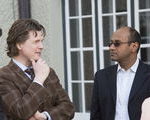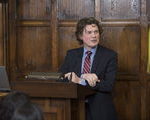Teacher of the Year award for Thorvardur Halfdanarson, M.D. – creating his own Icelandic saga in teaching
Thorvardur Halfdanarson, M.D. (HEMO ’07), a consultant in the Division of Medical Oncology, Department of Oncology at Mayo Clinic in Rochester, a professor of oncology and associate professor of medicine, says the only U.S. medical center he knew of when growing up in Iceland was Mayo Clinic. His grandmother was an avid reader and occasionally told him about the amazing medical center in a small town in Minnesota.
Dr. Haldanarson didn’t intend to go into medicine. He planned to go into engineering, but his math skills weren’t up to par. A friend who was applying to medical school encouraged him to apply, too. “He said if it doesn’t work out, you can drop out,” says Dr. Halfdanarson. “So I gave it a shot.”
During a pediatrics rotation in Iceland, one of Dr. Halfdanarson’s attending physicians had trained at Mayo Clinic and said he’d be glad if someone he trained went to Mayo Clinic. Dr. Halfdanarson wanted to go to Mayo for residency but didn’t get in. He completed a U.S. residency at the University of Iowa and went to Mayo Clinic Rochester for his fellowship training in hematology and oncology. After completing fellowship, he was on faculty at the University of Iowa for five years and then at Mayo Clinic in Arizona for almost three years. He missed Mayo Clinic in Rochester and the four seasons in the Midwest and made his way back to Rochester in 2015.
 He’s been actively teaching fellows, residents and medical students since 2007 but has been involved in education since his graduation from medical school in Iceland in 1995.
He’s been actively teaching fellows, residents and medical students since 2007 but has been involved in education since his graduation from medical school in Iceland in 1995.
What’s rewarding about teaching?
I like the challenge of being put on the spot by smart young people. I like influencing the next generations of students and sharing my successes and mistakes with trainees. As they say, “Good judgment comes from experience, and a lot of that comes from bad judgment.” Teaching is what gets me up in the morning. At heart, I’m a clinician. Patient care with trainees at an institution like Mayo is the ideal situation for me.
I learn from students every day in clinic. That’s what keeps me in education and what keeps me at an academic medical institution. Our trainees have greater insights into cancer biology and immunology, and can explain concepts to me that I’ve never properly understood. They’re so smart and well trained.
How do you know when you’ve done a good job teaching?
I don’t know if you ever know. You’re never done. I’m not done educating myself!
I feel successful when a fellow presents a case to me and every part of the plan is well thought out and I can tell they “got it.”
What’s your teaching style?
 Very low key and nonconfrontational. Instead of putting students on the spot, I try to tease out the answers, which are there most of the time, and then I fill in the blanks if there are any and provide additional information based on the situation and my experience.
Very low key and nonconfrontational. Instead of putting students on the spot, I try to tease out the answers, which are there most of the time, and then I fill in the blanks if there are any and provide additional information based on the situation and my experience.
In my first year of college at age 16, I had an Icelandic literature teacher who was at the end of his career. He was so engaging and so loved his topic, even at the brink of retirement. He used to tell us, with tears in his eyes, how much he envied us reading the Icelandic sagas for the first time. I wanted to be like him. That was probably the first time I realized I wanted to be an educator.
Trainees often stop by my office, especially when they’re halfway or more through training, defining their career focus and starting to look for jobs. I share my story and what worked for me. I listen to them, hear their worries, and validate their thoughts. I tell them if their decisions feel right, they’re probably right. I reassure them that if they don’t make the right decision, they can always change it. Sometimes they’re hesitant to leave Mayo. I encourage them to go out there and try it. If it doesn’t work, they can consider coming back. In our circles, changing your trajectory is often looked at as a weakness. It’s not. It’s OK to change course.
Who were your teaching role models?
My role models have been scattered along my training path. In oncology, I’d mention Ronald Richardson, M.D. (ONCL ’80, retired), Timothy Moynihan, M.D. (ONCL ’99), and Randolph Marks, M.D. (I ’89, ONCL ’93). In hematology, Louis Letendre, M.D. (I ’73, HEM ’75, ONCL ’77, retired). Also Clive Zent, M.D. (HEMO ’03), who is no longer at Mayo Clinic.
I’ve emulated Drs. Richards, Moynihan and Marks, who gently put trainees on the spot and gave them time to present their plans without cutting them off.
One of the best consultants I ever worked with was Throstur Laxdal, M.D. (PD ’68). He’d been a fellow in pediatrics at Mayo in the 1960s and was an associate professor of pediatrics at the University of Iceland and an attending at the University Hospital in Reykjavik when I was there. I worked with him when he was in his mid- to late 60s, and he was still infectiously enthusiastic about education, a true master clinician and a class-A human being. He had the ability to sense if his residents were uncomfortable taking care of sick children without direct supervision in the hospital and night and was always happy to come in to support us, no matter the time of the night.
What does the Teacher of the Year award mean to you?
I’ve received this award twice and several other similar awards. They mean a lot. They are confirmation that my teaching methods are effective and that I’m a valuable educator.
I’m not a very competitive person, so I’m happy for whoever wins. Many skilled teachers never get acknowledged.
Student comments:
“Dr. Halfdanarson is an outstanding consultant who has a wealth of knowledge that he shares with enthusiasm.”
“He’s always available and eager to teach. ‘Sure, no problem,’ is what you hear every time you call him with questions, regardless of his busy schedule.”
“Dr. Halfdanarson is willing to listen to our struggles and help us navigate the transition from internal medicine to medical oncology, and learn coping mechanisms. He is there when he is most needed.”
“We are and will forever be grateful for his guidance.”
“He is one of the coolest consultants you will ever meet, with his biking, amazing wardrobe and great presence on Facebook.”